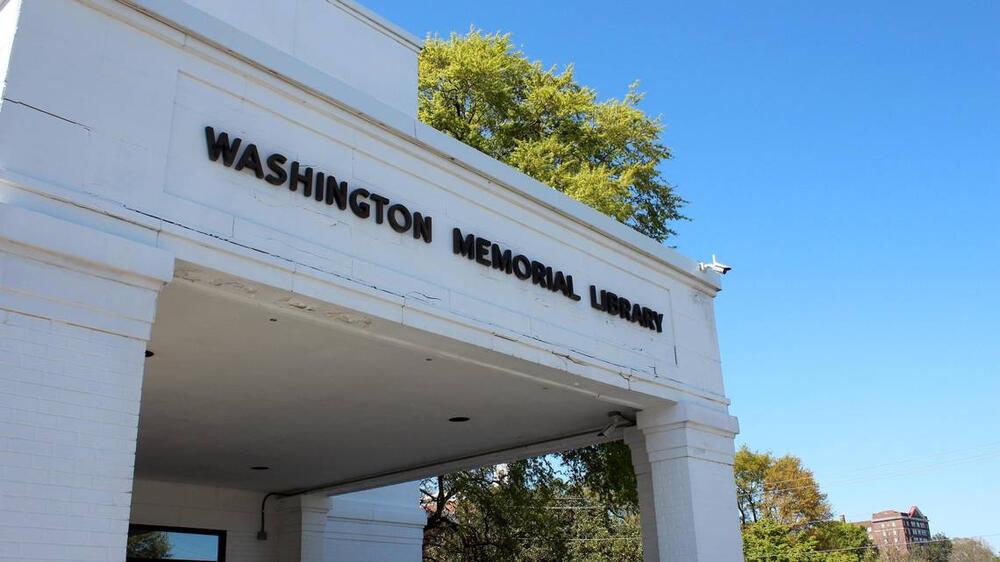
Caption
The Washington Memorial Library is located in Macon, Ga., and is part of the Middle Georgia Regional Library system.
Credit: Elizabeth Tammi Center for Collaborative Journalism

The Washington Memorial Library is located in Macon, Ga., and is part of the Middle Georgia Regional Library system.
Middle Georgia libraries may have to reduce programs as federal funding cuts impact museums and libraries across the nation.
Librarians said a program providing wifi hotspots to the community is ending after the terms changed for a grant that pays for the program.
Additionally, funding for a courier service that allows patrons to request a book from one library and have it driven to another is in danger as Congress considers cuts to the Institute for Museum and Library Services, an agency run by the federal government that provides money and resources to libraries across the U.S.
Both of these programs have been offered to Macon library patrons.
Alan Harkness, the director of the Chattahoochee Valley Library in Columbus and a former employee for the Georgia Public Library Service — the service that manages libraries across the state — said losing the money could disrupt services patrons and communities rely on.
“If the current administration doesn’t want to fund IMLS moving forward, then that’s going to hurt,” Harkness said.
In March, President Donald Trump issued an executive order eliminating “to the maximum extent consistent with applicable law” the IMLS, which is a major source of funding for libraries and museums across the U.S.
The move has been challenged in court, with a federal judge declining on June 6 to block the Trump administration’s actions while the case proceeds. The case will now proceed to U.S. District Court for the District of Columbia.
The move was part of Trump’s push to reduce what he and conservative allies say is wasteful government spending.
Harkness said the IMLS — which was created in 1996 — has faced threats to funding before, but Congress has re-authorized it under multiple administrations. However, Harkness said he worries the current Congress, where both houses are controlled by Republicans, may not retain the IMLS funding.
The proposed 2026 federal budget would allocate IMLS just $6 million, a far cry from its current $313 million budget. The reduction in funding would largely end grants to states from the IMLS to fund initiatives at museums and libraries. Congress is expected to make a final decision on the budget by Oct. 1.
Jennifer Lautzenheiser, director of the Middle Georgia Regional Library system, said public libraries in Macon and surrounding areas rely on federal funding to power a variety of programs.
The funding is funneled through the Georgia Public Library Service, which then distributes it to libraries around Georgia. Lautzenheiser said that in Georgia, federal funding for libraries is primarily used to make services more equitable. This can take the form of programs to address literacy, improve access to the internet in poor and rural areas, provide resources for job hunting, and support people with disabilities.
The hotspot program was one of those initiatives. The program was created using a grant and was intended to make hotspots available to people who may otherwise have trouble accessing an internet connection. However, the terms of the grant changed, and could no longer be used to pay for the data needed to power the hotspots.
Lautzenheiser said MGRL is currently exploring other options to use the nearly $43,000 to further connectivity, including purchasing Chromebooks for patrons and installing conferencing equipment in meeting rooms.
Other programs are under threat as well. The courier system may end of Congress doesn’t intervene.
According to the Georgia Public Library Service, the courier system used a little over $400,000 in federal money. While state funds also contribute a large portion, Harkness said the system needs federal funds in order to stay afloat.
“Public libraries are here to serve everybody,” Harkness said. “Having to get ensnared in the federal side of this is just frustrating.”
This story comes to GPB through a reporting partnership with Macon Telegraph.